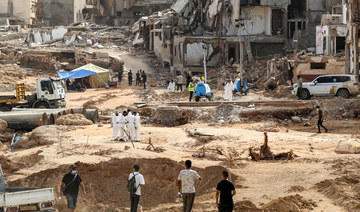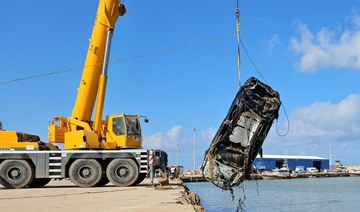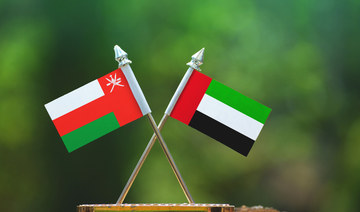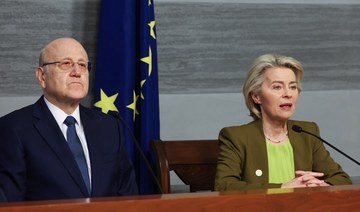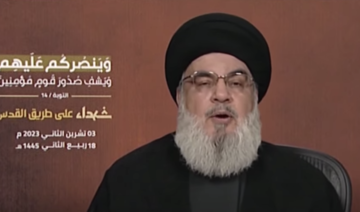MISRATA, Libya/BEIRUT: Over a month ago, Asmahan Balauon, a member of Libya’s eastern-based parliament, requested that it should establish a climate change committee.
She was told a date would be set to discuss the issue — but her efforts were overtaken by the fatal floods that struck the city of Derna this month after heavy rains caused the collapse of two dilapidated dams, unleashing a torrent of destruction.
“Unfortunately, our attention to... laws and elections and these things was a hindrance,” said Balauon, who is based in the coastal city of Benghazi.
Storm Daniel moved far faster than the conflict-torn nation’s politicians, triggering flooding that overwhelmed infrastructure and swept away parts of Derna, destroying hundreds of buildings.
The UN has confirmed more than 4,000 deaths from the disaster, while over 8,500 people remain unaccounted for.
A further 40,000 were displaced across northeast Libya, including at least 30,000 residents inside Derna, the UN said.
Scientists working with World Weather Attribution, a research collaboration that examines the role of global warming in specific weather events, said climate change made the heavy rainfall that led to Libya’s floods up to 50 times more likely and caused up to 50 percent more rain during that period of the year.
They also blamed other factors including building in flood plains, the poor condition of infrastructure, and years of armed conflict.
Libya’s situation echoes that of other turbulent countries like Afghanistan and large parts of Africa’s Sahel region, which face growing climate-related threats while grappling with political instability and weak governance, making it harder to access funding for measures to protect people and assets.
Back in 2007, South African Archbishop Desmond Tutu, a Nobel peace prize laureate, described this situation as “adaptation apartheid.”
“Leaving the world’s poor to sink or swim with their own meagre resources in the face of the threat posed by climate change is morally wrong,” he wrote in a UN report. “Unfortunately... this is precisely what is happening.”
That observation about the lack of finance for vulnerable people on the frontlines of a warming world — repeated many times since by a growing chorus of climate justice activists — appears to have changed little on the ground.
Ciaran Donnelly, a senior vice president for international programs at the International Rescue Committee, a global humanitarian agency, pointed to “an emerging kind of tiered system.”
He identified about 15 countries simultaneously suffering from climate volatility and conflict-driven political fragility, including Yemen and Somalia.
Much of the donor cash available for building resilience to more extreme weather and rising seas depends on having an effective government to receive the money — a requirement that risks excluding politically unstable states, he said.
“Countries... where you have this kind of weak public sector, just won’t be able to access (climate funding) and they’ll get further behind,” Donnelly said. “It really becomes a kind of self-reinforcing, vicious cycle.”
Climate change — while all but absent from the political narrative in Libya — has had a pronounced effect on the life of Walid Fathi, a 34-year-old government employee living in Al Bayda, a city west of Derna.
The floods swept away the back wall of his home and killed his neighbors, a family of seven.
What meagre savings he can muster from his salary will go toward fixing his house. He now lives in uncertainty and fear, afraid of the weather and what winter might bring.
“We do not know what to do,” he said. “We are afraid — we do not have anywhere to go.”
Neither the internationally recognized government in Tripoli nor the eastern authorities that have controlled Derna since the Libyan National Army (LNA) ousted jihadists from the city in 2019 had attempted to repair long-known weaknesses in the dams or tried to evacuate people before the forecast storm hit.
In addition, people living in different parts of the city were given different instructions by the authorities, said local families. Those living by the shore were told to evacuate, while others in the center were told to stay put, they noted.
The LNA under Khalifa Haftar is the dominant player in the eastern half of Libya, a nation that has been divided since a NATO-backed uprising toppled Muammar Qaddafi in 2011.
Mohamed Manfour, commander of an airport near Al-Bayda in the east, blamed the flood disaster on the international community and on governments ruling the two halves of the country.
“There are mistakes in the infrastructure, mistakes in the construction and architecture, mistakes in the lack of maintenance of dams,” he said in a phone interview.
In the hours after the catastrophe, LNA chief Haftar said on local television that the flood-hit area was suffering “difficult and painful moments,” adding he had issued orders for necessary support to be provided.
Tim Eaton, a senior research fellow on the Middle East and North Africa with Chatham House, a London-based think-tank, said the focus of many who have managed to gain power in Libya “has been staying in power,” rather than working to protect the population from external threats like climate change.
“You are definitely not going to be able to do these things and access these (climate) funds if nobody is really thinking about them and it’s not part of the political discourse,” he added.
Earlier this month, the head of the World Meteorological Organization said casualties could have been avoided in Libya’s floods if the divided country had a functional weather service.
Over in the west, at the Meteorological Center in the capital Tripoli, the number of people with technical expertise in climate change “can be counted on your fingers,” spokesperson Mohieddine Bin Ramadan told Context.
The center, which falls under the transportation ministry, lacks radars that can accurately measure rainfall across the country. Bin Ramadan said the public administration is corrupt — and bureaucracy often delays orders for months and years.
“If the government does not take care of the center, then we cannot keep up with climate change,” he said. “We are missing a lot of things; it is not easy.”
The transportation ministry did not immediately respond to a request for comment.
The same issue affects climate services and infrastructure in other places around the world.
Depending on how they are managed and funded, they can either expose people to the impacts of climate change — as in Libya — or help protect them if well-maintained and planned to stand up to future climate risks.
Most of the Earth’s dams were built in the 1960s and 1970s, said Caitlin Grady, an engineering professor at George Washington University in the United States, adding that many are now reaching the end of their lifespan, threatening disaster.
“We’re still going to have extreme rainfall events all over the world,” she said, adding “I would expect this to keep happening in multiple locations unless something changes in our fight” against climate change and for climate adaptation.
Libya flood deaths expose climate chasm in conflict-hit states
https://arab.news/w45mv
Libya flood deaths expose climate chasm in conflict-hit states

- Scientists: climate change made the heavy rainfall that led to Libya’s floods up to 50 times more likely and caused up to 50 percent more rain during that period of the year
UAE president presents Indonesia’s defense minister with Order of Zayed

- Subianto receives UAE’s highest civil honor in recognition of his contribution to improved bilateral cooperation
DUBAI: UAE President Sheikh Mohammed bin Zayed Al-Nahyan on Monday presented Indonesia’s defense minister, Prabowo Subianto, with the Order of Zayed, the UAE’s highest civil honor, in recognition of his contribution to the enhancement of cooperation between the countries.
During the meeting in Abu Dhabi, Subianto conveyed greetings from Indonesia’s President Joko Widodo and expressed his desire for the continued advancement and prosperity of the UAE, the Emirates News Agency reported. Sheikh Mohammed responded with similar wishes for Indonesia.
The president and defense minister also discussed the relationship between their countries, particularly as it relates to defense and military affairs, and ways in which it might be enhanced in the interests of both countries, and reviewed regional and international issues of mutual interest.
Sheikh Mohammed said he was keen to leverage the strong strategic ties between the UAE and Indonesia to deepen cooperation so that both nations benefit from shared opportunities for development and prosperity.
Kuwaiti emir, Omani sultan meet for official talks

- Leaders discussed the longstanding relationship between their countries
KUWAIT: Kuwait’s Emir Sheikh Meshal Al-Ahmad Al-Jaber Al-Sabah hosted Oman’s Sultan Haitham bin Tareq at Bayan Palace in Kuwait City on Monday for official talks.
The leaders discussed the longstanding relationship between their countries and explored avenues for enhancing cooperation in various sectors, the Kuwait News Agency reported.
They also addressed strategies for the advancement of the Gulf Cooperation Council, matters of shared interest and various regional and international affairs.
The meeting came during the sultan’s two-day state visit to Kuwait and was followed by a banquet held in his honor.
Kuwait’s Prime Minister Sheikh Ahmad Al-Abdullah Al-Sabah and other officials from the two countries also attended the meeting.
US doesn’t believe ‘genocide’ occurring in Gaza: White House

- White House National Security Adviser Jake Sullivan insisted that the responsibility for peace lay with Hamas
- Biden has come under fire from Republicans for halting some weapons shipments
WASHINGTON DC: The United States does not believe that genocide is occurring in Gaza but Israel must do more to protect Palestinian civilians, President Joe Biden’s top national security official said Monday.
As ceasefire talks stall and Israel continued striking the southern city of Rafah, White House National Security Adviser Jake Sullivan insisted that the responsibility for peace lay with militant group Hamas.
“We believe Israel can and must do more to ensure the protection and wellbeing of innocent civilians. We do not believe what is happening in Gaza is a genocide,” Sullivan told a briefing.
The US was “using the internationally accepted term for genocide, which includes a focus on intent” to reach this assessment, Sullivan added.
Biden wanted to see Hamas defeated but realized that Palestinian civilians were in “hell,” Sullivan said.
Sullivan said he was coming to the White House podium to “take a step back” and set out the Biden administration’s position on the conflict, amid criticism from both ends of the US political spectrum.
Biden has come under fire from Republicans for halting some weapons shipments to press his demands that Israel hold off a Rafah offensive, while there have been protests at US universities against his support for Israel.
The US president believed any Rafah operation “has got to be connected to a strategic endgame that also answered the question, ‘what comes next?’” Sullivan added.
This would avoid Israel “getting mired in a counterinsurgency campaign that never ends, and ultimately saps Israel’s strength and vitality.”
First international UN staff member killed in Gaza attack

- Guterres “was deeply saddened to learn of the death of a UN DSS staff member and injury to another DSS staffer when their UN vehicle was struck,” spokesperson said
- “The Secretary-General condemns all attacks on UN personnel and calls for a full investigation,” Haq said
UNITED NATIONS: A UN security services member was killed in an attack on a vehicle in Gaza on Monday, a spokesperson said, adding the death was the first international UN employee killed in the Palestinian territory since the war began.
UN chief Antonio Guterres “was deeply saddened to learn of the death of a United Nations Department of Safety and Security (DSS) staff member and injury to another DSS staffer when their UN vehicle was struck as they traveled to the European Hospital in Rafah,” said his deputy spokesperson Farhan Haq.
It was “the first international casualty” for the UN since the start of the Israeli offensive in Gaza in retaliation for the Hamas attack of October 7, Haq said, recalling that some 190 Palestinian UN employees have been killed, mainly staff of the UN Palestinian Refugee Agency (UNRWA).
“The Secretary-General condemns all attacks on UN personnel and calls for a full investigation,” Haq said.
The spokesman did not immediately release the nationality of the person killed.
“I don’t have the full details of whether this was part of a large convoy or not, I believe it was in a convoy that was moving, and this was the DSS vehicle that was hit,” he said.
The DSS oversees the security of UN agencies and programs in more than 130 countries around the world.
Hezbollah chief urges Beirut to allow Syrian migrant boats to leave for Europe

- Hassan Nasrallah called for ‘a national decision that says: we have opened the sea... whoever wants to leave for Europe, for Cyprus, the sea is in front of you. Take a boat and board it’
- Cyprus, the EU’s easternmost member, is less than 200 kilometers (125 miles) from Lebanon and Syria, and wants to curb migrant boat departures from Lebanon toward its shores
BEIRUT: Hezbollah chief Hassan Nasrallah on Monday urged Lebanese authorities to open the seas for migrant boats to reach Europe, amid soaring anti-Syrian sentiment and accusations the West is seeking to keep refugees in Lebanon.
His remarks came in an apparent bid to pressure the European Union after it announced earlier this month $1 billion in aid to Lebanon to help tackle irregular migration.
Many in crisis-hit Lebanon have criticized the aid package as focused on preventing refugees from leaving the country, amid mounting calls for them to return home.
In a televised address, Nasrallah called for “a national decision that says: we have opened the sea... whoever wants to leave for Europe, for Cyprus, the sea is in front of you. Take a boat and board it.”
But “we do not propose forcing displaced Syrians to board boats and leave for Cyprus and Europe,” he added in the speech, broadcast on the group’s Al-Manar television channel.
Cyprus, the EU’s easternmost member, is less than 200 kilometers (125 miles) from Lebanon and Syria, and wants to curb migrant boat departures from Lebanon toward its shores.
Currently refugees “are prohibited (from leaving), and so they turn to smuggling and to rubber boats, and there are drownings in the sea, because the Lebanese army is implementing a political decision to stop them from migrating,” Nasrallah added.
Lebanon says it currently hosts around two million people from neighboring Syria — the world’s highest number of refugees per capita — with almost 785,000 registered with the United Nations.
Lebanon needs to tell the West that “we all have to coordinate with the Syrian government to return the displaced to Syria and to present them with aid there,” Nasrallah said.
He also urged Lebanon’s parliament to press the EU and Washington to lift sanctions on Syria that Damascus says are blocking aid and reconstruction efforts, adding: “If sanctions on Syria aren’t lifted, there will be no return” of refugees.
Nasrallah’s remarks came a day before Lebanon is expected to resume “voluntary returns” of Syrians, with dozens of families set to pass through two land border crossings in the country’s east, a year and a half after such returns were paused.
Lebanon’s economy collapsed in late 2019, turning it into a launchpad for migrants, with Lebanese joining Syrians and Palestinian refugees making perilous Europe-bound voyages.
Some Lebanese politicians have blamed Syrians for their country’s worsening troubles, and pressure often mounts ahead of an annual conference on Syria in Brussels, with ministers meeting this year on May 27.
Rights groups including Amnesty International and Human Rights Watch have warned that Syria is not safe for returns.



